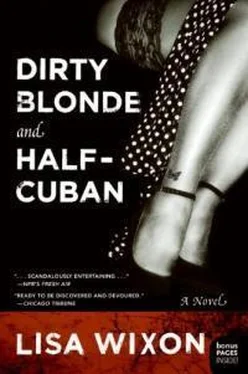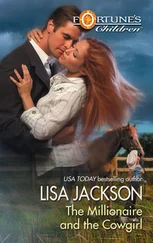Lisa Wixon - Dirty Blonde and Half-Cuban
Здесь есть возможность читать онлайн «Lisa Wixon - Dirty Blonde and Half-Cuban» весь текст электронной книги совершенно бесплатно (целиком полную версию без сокращений). В некоторых случаях можно слушать аудио, скачать через торрент в формате fb2 и присутствует краткое содержание. Жанр: Современная проза, на английском языке. Описание произведения, (предисловие) а так же отзывы посетителей доступны на портале библиотеки ЛибКат.
- Название:Dirty Blonde and Half-Cuban
- Автор:
- Жанр:
- Год:неизвестен
- ISBN:нет данных
- Рейтинг книги:4 / 5. Голосов: 1
-
Избранное:Добавить в избранное
- Отзывы:
-
Ваша оценка:
- 80
- 1
- 2
- 3
- 4
- 5
Dirty Blonde and Half-Cuban: краткое содержание, описание и аннотация
Предлагаем к чтению аннотацию, описание, краткое содержание или предисловие (зависит от того, что написал сам автор книги «Dirty Blonde and Half-Cuban»). Если вы не нашли необходимую информацию о книге — напишите в комментариях, мы постараемся отыскать её.
Dirty Blonde and Half-Cuban — читать онлайн бесплатно полную книгу (весь текст) целиком
Ниже представлен текст книги, разбитый по страницам. Система сохранения места последней прочитанной страницы, позволяет с удобством читать онлайн бесплатно книгу «Dirty Blonde and Half-Cuban», без необходимости каждый раз заново искать на чём Вы остановились. Поставьте закладку, и сможете в любой момент перейти на страницу, на которой закончили чтение.
Интервал:
Закладка:
Culturally, the guidebook tells me, the isolated Cuba—by accident and by design—is a social version of Darwin’s Galápagos, where creatures form and evolve in unusual and beautiful ways, quarantined by endless miles of water.
Within that isolation is the hopeful dream of finding my father.
We’ve chosen a sweltering morning to arrive in Havana. As we taxi into the capital, I tell Aunt June how I’m reminded of being nine years old, and riding with my parents for the first time through the streets of Beijing. The red Mandarin symbols looming over every shingle captured my imagination. China, to me, seemed not like a new country, but a different planet entirely.
As in China, Cuba’s scenery also proves otherworldly. Billboards that in any other land would advertise Shell Gas or Nike blare revolutionary slogans with doe-eyed guerillas waging a war against the goliath Uncle Sam. These fervor-pitch banners give Havana the overall effect of not being a modern city at all, but a Berkeley dorm room circa 1969.
“Never could figure out your momma’s passion for travel,” says Aunt June, trying to appear relaxed in her maiden voyage abroad. I stare at Aunt June’s profile under a broad straw hat and smile, grateful for the remaining family I have left.
As we ride in the back of a poky Lada—the ubiquitous Russian sedan one slight letter off from sharing the Spanish word for tin can—a new dawn breaks, and a glowing sun kisses the enigmatic city with its light.
Seductive as a striptease, Havana begins to reveal herself. We stare out the window at the startling loveliness of the city: something Arabic 1500s here, something Spanish 1600s there, something American 1950s here. Nothing aesthetically contrived, centuries accidentally blended. Organic and unexpected beauty.
Once-opulent houses of worship and opera and theater stand shivery and peeling. Havana, a European-style capital long forgotten, is magnificent and gray. A baroness at the end of her long life, numbed by a destitution not foreseen.
Aunt June gasps at the beauty and the destruction.
“Goodness,” she exclaims. “It looks like a war movie!”
TRUTH IS, THE first trip to Cuba turned up nada.
Though I found the hospital where I was born, and confirmed John’s name on my birth certificate, little headway was made. I could barely get my bearings. Timbaplayed everywhere. Roosters crowed at all hours, and vintage American cars cruised along battered roads. Precious paintings were housed in buildings of restored Art Nouveau. In the distance, a deep sapphire sea was fronted by turquoise waters floating over coral and limestone.
Royal palm trees hovered as tall as skyscrapers. Cocktail lounges and discos blared with tango and flamenco, rumba and cha-cha-chá.Cubans were loud, friendly, and always seemed to be dancing.
What came over me, slowly and imperceptibly, as I drank in the spectacle, was a burning desire to find José Antonio. At first, I’d just wanted to see the island where I was born, but soon the possibilities of finding him and his family captured my imagination. In the context of all this beauty, in this culture of Cuba, this cubanidad,I realized that I’d be inheriting much more than a Spanish last name. I’d be gaining a heritage. And so it was this way that my mother’s wish finally became mine, and the promise I’d made to her to find José Antonio became the promise to myself, to discover this secret link into my past.
When I told this to my aunt, she seemed more than pleased.
“All I can say is I’m glad to know where my poppa was from. Mississippi. Fun to spell, easy to navigate, signs in English. Not like thisgodforsaken place,” she said, shaking her head.
Aunt June spent our month at the hotel, a former American Mafia haunt, enjoying the citric pleasure of Hemingway daiquiris delivered poolside. She rarely left the grounds, but over the days warmed to the easy rhythm. By the time we left, she claimed Havana to be the most beautiful city she’d ever seen.
“Don’t know if your momma loved the man or the island,” said Aunt June. “Can’t say I ever would’ve left.”
After our time expired, we did leave, though neither of us voiced our disappointment in not tracking José Antonio. At the airport terminal with Aunt June, I realized what the trip had truly been about. It had been about her spending time with me, her only niece, and encouraging me in whatever way possible to seek my own happiness, knowing I’d been dealt a strange deck of familial cards.
I’m certain my aunt understood that in this archeological dig, we were just brushing at the surface. She also must have known that I never would’ve had the courage to take this first step alone.
At the airport, I threw my arms around her in thanks. “I’m going to miss you,” I said, not knowing it was the last time I’d ever see her.
In Cancún, she flew to Mississippi via Houston, and I to Hartford through New York. After an uncomfortable July spent in the company of my grandparents in Connecticut, I snuck back into Cuba for a few weeks in August, this time brave enough to go alone.
THE MAP OF Havana was $7 in the tourist shop, and a cafecito—a thimble shot of dark, sweet coffee—helped me study its possibilities.
Although maps are central to my personal history, to understanding my family and their life as diplomatic tramps, the map of Havana tells me only one thing.
How very lost I am.
“What’s your hurry to get home, anyway?” Victor Alvarez interrupts my thoughts. He’s a meticulous government man in his late sixties, and the first fruitful contact I’ve made in Cuba.
“The best way to do this difficult search,” he continues, “is to move here. Become a temporary resident.”
“Isn’t that impossible? I’m an American. I’m not even supposed to be here for a weekend.”
“ Mira,it’s easy, actually. Just sign up for a student visa.” Victor fiddles with buttons on a suit that could’ve been the same one he wore when the revolutionaries first burned through town in 1959. “You can stay a year. You can’t leave during that year, but you can stay.”
“Just like Hotel California.”
Victor looks at me quizzically. “You need to be here to find what you’re looking for, and even if you’re here full-time it will take months just to find the address of your parents’ home. But you’re not going to progress como así.No one trusts a tourist.”
“I can’t stay a year,” I say. “I can barely stay a few weeks. Can’t I just phone you?”
Victor emits one of his long laughs that implies he’s dealing with a clueless outsider, an extranjera.“The people who can help you, and you’ll have to meet many before you find them, won’t trust you unless they can look you in the eye.”
The frustratingly slow progress I’ve made thus far confirms for me that Victor is telling the truth. “Student visa buys me a year?”
“ Sí, mi amor.A whole year.”
Still, I shake my head. As much as I enjoy Cuba, I feel in my heart I may never, ever find my needle in that haystack. I love the idea of owning Cuban blood, but living in Havana, with its chronic shortages and blackouts and suspicions of long-term guests, is not something I could prepare for. Victor is wrong, my search could take more than a year. It could take my whole life.
On the plane to London, where I was about to begin graduate school, I resigned myself to knowing that I’d tried. I’d made an effort to track José Antonio, but found myself understanding even less than when I began. A State Department family’s life is a closely guarded secret in enemy territory, and I had no idea where to begin.
Finding José Antonio—if, indeed, he even existed—would take much more than a preprinted map of that immense, sun-soaked city. It would take a seer. A higher power. A conversation with the dead.
Читать дальшеИнтервал:
Закладка:
Похожие книги на «Dirty Blonde and Half-Cuban»
Представляем Вашему вниманию похожие книги на «Dirty Blonde and Half-Cuban» списком для выбора. Мы отобрали схожую по названию и смыслу литературу в надежде предоставить читателям больше вариантов отыскать новые, интересные, ещё непрочитанные произведения.
Обсуждение, отзывы о книге «Dirty Blonde and Half-Cuban» и просто собственные мнения читателей. Оставьте ваши комментарии, напишите, что Вы думаете о произведении, его смысле или главных героях. Укажите что конкретно понравилось, а что нет, и почему Вы так считаете.












